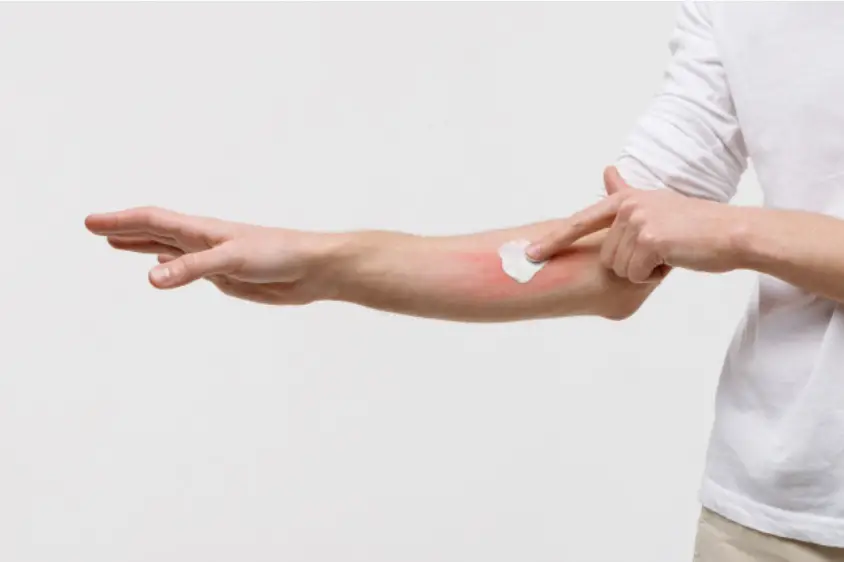The question that can’t really be answered, how long can Eczema last? Eczema affects around 10% of the people worldwide that for some, is a lifelong chronic condition with multiple flare-ups that can take weeks to settle. Eczema is developed from a reaction to various substances that affect the immune system, such as allergens and chemicals.
How long can Eczema last? It is hard to answer when there is no cure and it cannot disappear if untreated. To describe a relationship with Eczema, it is a long battle that can have no positive outcomes. Different people have different triggers, and for most people they require careful avoidance of triggers.
Eczema can begin to develop as a child with improved symptoms as they get older. Around 60 percent of Eczema sufferers get it as an infant.
How long can flare-ups last?

Eczema can be divided into stages that can give an indication of how severe the flare-up is. Chronic is the most common stage of Eczema and generally last over a lifetime with regular flare-ups, although it can improve with age.
Acute is short-term, with skin sensitivities occurring after coming into contact with something that is irritating the skin. It can last for a few weeks. Lastly, subacute is a healing phase. Flare-ups can still occur if it is not treated.
It depends on severity and how one approaches their battle with Eczema. The healing time can vary depending on multiple factors. Normally, a flare-up will go away after a few weeks when treated, but if the trigger is no identified and avoided, longer-lasting flares will occur.
The short answer to the question, it is unidentifiable/inconclusive.
How can we prevent Eczema flare-ups?
The million dollar question. There is no known cure and different people can have different triggers. The best way to prevent flare-ups is to identify what is not compatible with your skin and to ensure that what you come in contact with and consume into your body, should be full of ingredients/substances that are not harmful.
Avoiding triggers is the first step. Note down what you are sensitive to and consider what is in your environment. Is it something that can be avoided? From products to food, one must consider everything in their surroundings.
For more information on what foods you can eliminate, you can read our ‘Top 6 Foods to Avoid for Eczema’ article.
Protecting the skin

Moisturising your skin is one of the important factors to protecting your skin’s barrier. It is essential when treating Eczema, especially after bathing. Avoid any lotions with fragrances and free of preservatives.
Check the ingredients to get a better indication of whether the product is right for you. For this, you can use 1Source.com to analyze and rank the safety of ingredients for you.
There are other ways to help protect the skin. The goal is to prevent cracks and cuts, as this will lead to infections. Avoiding the temptation to scratch is easier said than done, but scratching is the number one cause for Eczema to worsen and become more severe.
Environment
The cleanliness and consistency of your environment will reflect on your skill. Make sure you have the stability and consistency to give your skin a chance to rebuild itself. Remember, what you come in contact can have a heavy influence on your skin.
Things to consider can range from what cleaning products you use, to how cool your home is. Eczema can be very dry, so heat and high humidity can make the symptoms worse. Clothes are something you come in contact with everyday. Choose breathable fabrics such as cotton so your body has a chance to let heat escape.
Another article we have is our top ’10 Tips for Soothing Eczema’ which will help you get started.
What is the cause of Eczema?
The most common cause of Eczema is allergies. Any substances that causes a negative immune reactions can develop inflammatory skin condition. Eczema is caused by underlying inflammation.
Allergies for Eczema can be one (if not more) of many things such;
- Pollen
- Food
- Pet Dander
- Chemicals
- Fabrics
- Dyes
If you have a parent that has a history of allergies or Eczema related symptoms, you should contact your doctor or dermatologist for an in-depth allergy review. Eczema is not contagious, but like allergies, it can be passed down in families.
How long can Eczema last with treatment?

There are multiple treatments one can try. The most effective method depends on your underlying triggers and responses from previous medical treatment. There is a lot of trial and error when it comes to tackling Eczema. Doctors usually recommend the following;
- Prescription creams/medication
- Allergy shots
- Antihistamines (over-the-counter)
- Natural treatments at home
Doctors do not give out a set time frame of when your skin will get back to ‘normal’ or to the consistency you desire. As mentioned before, there are many factors involved in the healing of Eczema, simply applying a cream is not enough.
How long can Eczema last? If treated effectively, it can take several weeks for rashes to clear up. Eczema is lifelong and will occur if a negative immune reaction develops. Eczema tends to improve with age, but there is no guarantee of this happening.
Any information about treatments you should consult a doctor or dermatologist.

